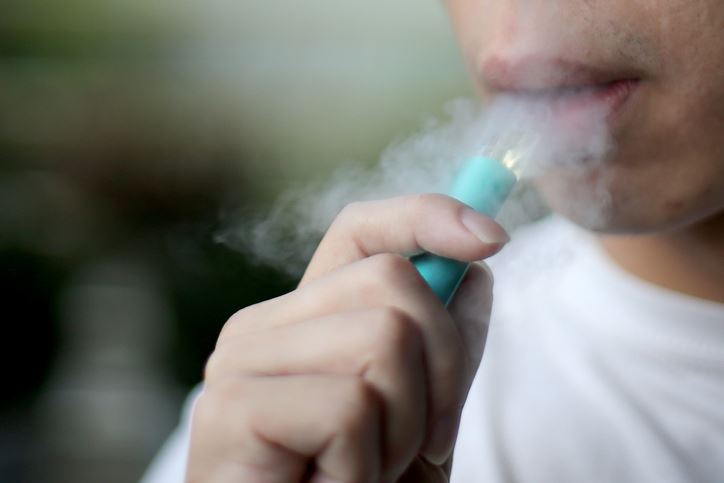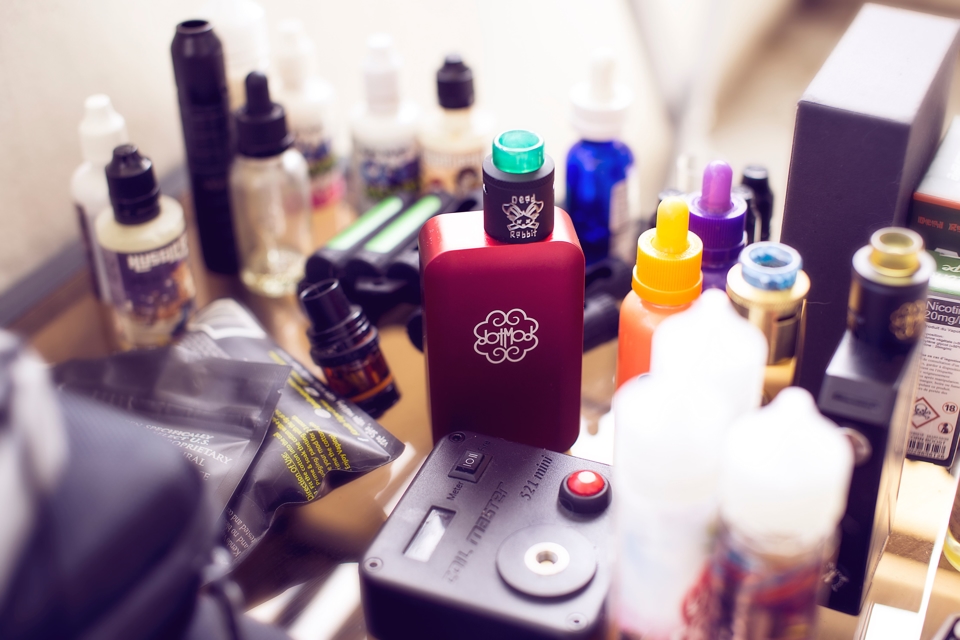A List of Which States Tax Zero-Nicotine Vapor Products and Electronic Cigarettes
Excise taxes on vapor products, e-cigarettes, and other related items are a growing trend among state revenue departments. While over half of U.S. states now have a vapor product tax, each does so with unique terms, classifications, and other caveats that create a wide range of tax consequences. As a multi-state operator, you could have several different tax and licensing requirements for the same product. Topping the list of distinctions that affect taxability is whether your vapor product contains nicotine. Some states exclude these items from tax while others explicitly include them. See if any of your business’s operations reach the below states that tax zero-nicotine vapor products.
The Following States Have Excise Taxes on Zero-Nicotine Vapor Products
States that tax vapor products are mostly split on whether to include zero-nicotine products with the following 17 states choosing to do so.
Georgia
As of 2021, the Georgia Department of Revenue imposes an excise tax on alternative nicotine products and consumable vapor products. Georgia’s code defines consumable vapor products as “any liquid solution, whether it contains nicotine or not, that is intended to be heated into an aerosol state and inhaled by an individual.” See § 48-11-1(17). The excise tax is five cents per fluid milliliter of consumable vapor product or seven percent of the wholesale cost for a single use vapor device containing a consumable vapor product. All businesses handling vapor products in Georgia must obtain a license or amend their current tobacco licenses to include the sale of alternative nicotine products or consumable vapor products.
Illinois
Illinois regulates and taxes electronic cigarettes, which includes “any solution or substance, regardless of whether it contains nicotine.” This includes electronic cigars, pipes, hookah, vape pens, and similar products. The definition of electronic cigarette does not include any FDA-approved tobacco cessation product, tobacco dependence product, or approved for another medical purpose. See 35 ILCS 143/10-5(3). Additionally, Illinois excludes electronic devices designed solely for use with cannabis from the excise tax under the Compassionate Use of Medicinal Cannabis Program Act and the Cannabis Regulation and Tax Act. The tax is 15 percent of the wholesale price minus applicable deductions.
Indiana
Indiana also taxes electronic cigarettes at the rate of 15 percent of the gross retail income and the retail dealer is responsible for collecting and remitting the tax to the Department of Revenue. See General Tax Information Bulletin #206.
Closed system cartridges (CSC) are taxable at 15 percent of the wholesale price and is the obligation of the distributor. These vapor products include any item that converts e-liquid to a vapor intended for inhalation, and state law defines e-liquids as a substance that “may or may not contain nicotine”. See § 7.1-7-2-23 and 7.1-7-2-10(1).
Kentucky
The Kentucky Department of Revenue imposes excise taxes on both closed vapor cartridges and open vaping systems. This tax includes items that use or vaporize non-nicotine substances. See KRS 138.130(4)&(10) (the definitions for “closed vapor cartridge and open vaping system). The tax rate on vapor cartridges is $1.50 per cartridge, and the tax rate for open vaping systems is 15 percent of the actual price it is sold by the distributor.
Maine
The state of Maine broadly taxes electronic smoking devices and liquids, whether they have nicotine or not. The law defines an electronic smoking device as an item that “delivers nicotine or any other substance intended for human consumption that may be used to by a person to simulate smoking through inhalation of vapor or aerosol. 36 M.R.S. § 4401(2-A). As of January 2, 2020, electronic smoking devices are subject to a 43 percent excise tax rate.
Maryland
Maryland has a more complex taxation method for electronic cigarettes and vapor products. Instead of a separate excise tax, the state has an enhanced sales and use tax for “electronic smoking devices” (ESD) and for “vaping liquid”. The tax rate for ESDs is 12 percent of retail sales price, and the rate for vaping liquid is 60 percent of the retail sales price for containers of 5 milliliters or less. See Bulletin TT-78 February 23, 2021. The state’s business regulations define ESDs as any device that delivers aerosolized or vaporized nicotine to an individual inhaling from the device but excludes products that the FDA authorizes for sale. In contrast, vaping liquid includes any liquid whether it contains nicotine or not. See § 16.7-101.
Massachusetts
The Commonwealth taxes and requires licensure of retailers and distributors that wish to sell flavored or non-flavored vaping products, which the state refers to as electronic nicotine delivery systems (ENDS). The term ENDS is a slight misnomer because the state defines it as a device “that can be used to deliver nicotine or another substance.” Mass. Gen. Laws Chapter 64C § 7E(a) (emphasis added). However, the term excludes devices approved by the FDA as a tobacco cessation product. The excise tax rate for ENDS in Massachusetts is 75 percent of the wholesale price as of June 1, 2020.
Nevada
Nevada’s excise tax on other tobacco products (OTP) includes vapor products that contains nicotine “or any other substance” for use or inhalation to simulate smoking. See NRS 370.054. The excise tax rate on vapor products is 30 percent of the wholesale price.
New Mexico
New Mexico broadly taxes e-cigarettes and e-liquids, which the statute defines as any item containing nicotine “or any other substance” for the purpose of inhalation that imitates smoking. See NMSA 7-12A-2(E)&(F). The tax rate for e-cigarettes sold in New Mexico is 12.5 percent of the product’s value for the manufacture or acquisition of e-liquids and is $.50 per closed system cartridge. See NMSA 7-12A-3(D)&(E).
New York
New York requires vapor products dealers to register with the New York Department of Taxation and Finance. The state imposes a 20 percent supplemental sales tax on retail purchases. The tax applies to all noncombustible liquids and gels, regardless of whether they contain nicotine or not.
Oregon
The state of Oregon broadly taxes “inhalant delivery systems” under its tobacco products tax framework. The term includes e-cigarettes, vape products, and e-liquids—regardless of whether it contains nicotine or not. These items are subject to a 65 percent excise tax on the wholesale purchase price.
Pennsylvania
The Pennsylvania Department of Revenue enforces the state’s vapor products tax at 40 percent of the wholesaler purchase price. The tax extends to all electronic cigarettes and related liquids or substances no matter if they contain nicotine or note.
Utah
Utah has a 56 percent excise tax on electronic cigarettes, alternative nicotine products, and electronic cigarette substances. The state’s Code broadly defines electronic cigarette substances as “any substance, including liquid containing nicotine, used in an electronic cigarette. See Utah Code 76-10-101(6).
Vermont
As of July 1, 2019, electronic cigarettes became subject to Vermont’s Tobacco Products Tax, which applies a 92 percent rate, added to the final retail price when sold to a consumer. The tax applies to all tobacco substitutes and liquids regardless of them containing nicotine or other substances.
Washington
Washington has a two-tier tax rate that applies to the sale of vapor products in the state. Accessible containers of solutions greater than 5 milliliter have $.09 charge per milliliter. The state taxes all other vapor products at a rate of $.27 per milliliter. Washington considers all cartridges, liquids, solutions, and other consumable substances for inhalation regardless of the presence of nicotine.
West Virginia
West Virginia imposes an electronic cigarette liquids excise tax that applies to any liquid or mixture used in an e-cigarette. The Tax Division asserts that absence of an ingredient in a liquid, such as nicotine, does not change the taxability. The tax rate on electronic cigarette liquids is $.075 per milliliter of liquid or fractional amount. E.g., 1.2 milliliters get taxed as 2 milliliters for a total of $.15.
Wisconsin
Wisconsin has a vapor products tax that applies at a rate of $.05 per milliliter of liquid or other substance, regardless of the exclusion of nicotine. See Wisconsin Department of Revenue FAQ #5.
If you have questions about how state and local taxes could apply to your sale or handling of electronic cigarettes and vapor products, schedule a consultation with one of our professionals today. We provide a variety of excise tax-related services for manufacturers, importers, distributors, wholesalers, retailers, and others facing audits, assessments, or other challenges with state revenue departments. Contact us today.






